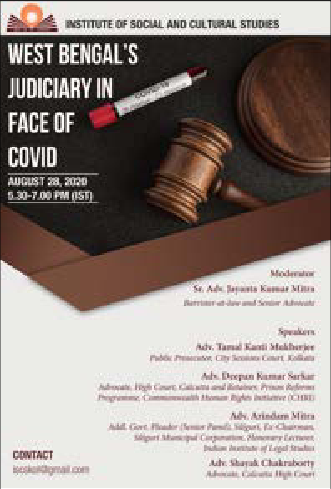The Webinar series titled “West Bengal’s Judiciary in the face of Covid” held on on August 28, 2020commenced with the opening statement of Kankana Roy on behalf of Institute of Social and Cultural Studies, where she herself introduced the distinguished speakers of the webinar and thereafter adjured the moderator of the webinar advocate Jayanta Kumar Mitra to coordinate the session . The moderator of the webinar ,Mr.Jayanta Kumar Mitra, Senior Advocate and Barrister – in – Law in his introductory speech touched the issue of how the on-going Covid Pandemic had been impacting the overall functioning of the judicial system in India. He said that Covid 19 had seriously hindered the justice delivery system of the country including the state of West Bengal and emphasised the necessity of having virtual courts to deliver justice to the litigants. Mr.Tamal Mukherjee , Public Prosecutor, City Sessions Court, Kolkata narrated the negative impact of the global pandemic which had spread its wings in every sphere of human life , and commented that judiciary system had resorted to virtual hearing in order to make justice delivery system operational. However he pointed out that due to lack of best technological and communicational infrastructural development such virtual hearing was facing serious problems.
Advocate Deepan Kumar Sarkar, High Court, Calcutta and the Retainer, Prison Reforms Programme,
Commonwealth Human Right Initiative, very eloquently started his deliberation by analyzing our constitution which clearly narrated the functions of the judiciary, executive and the legislature respectively. He briefly discussed the lack of development in the judicial infrastructure of West Bengal and focused his discussion on the impact of the pandemic over the functioning of the judiciary system in this province. He said that due to the ongoing pandemic the judicial system of West Bengal had being delivering justice through virtual hearing. However in doing so the system was facing technological and connectivity bottlenecks. He opined that to make virtual hearing more effective better internet connection was a necessity. He also raised an important issue of inequality which was associated with such virtual hearing.
He opined that people with low income group , or from a distant village might fail to avail the service of such virtual hearing hindering their right to get free and fair justice. He said that at present lower judiciary was facing a huge problem to adapt the new technologically driven model of justice deliverance. He suggested a few steps to solve such problems like urging the state government to release adequate fund so that the infrastructure for the virtual connection could be set up specially for the lower courts. He recommended that the judiciary should not restrict itself with the urgent cases and also proposed to start physical hearing in a phased manner which could take place by following adequate health guidelines. Mr.Arindam Mitra, Additional Government Pleader( Senior Panel) , Siliguri , in his presentation through a plethora of statistics showed how the global pandemic had created a negative impact over the activities of the judicial system throughout the country. He concluded his discussion by pointing out a recent trend that had emerged within the judicial system during the pandemic where due to the delay in deliverance of justice the litigants were going for settling their issues through out of court settlement
formula.
The last speaker of the webinar Mr.Shayak Chakrabarty, Advocate , High Court, Calcutta , commented that until the rise of the pandemic judiciary never took the model of the e- courts seriously. He said that time had come when legal experts must adopt themselves with the new model of e- courts. However he opined that such technologically driven justice delivery system had its own drawbacks,i.e.lack of proper connectivity related infrastructure. He pointed out that the judiciary during the pandemic period was only handling the urgent cases. But the definition of urgent was so subjective that anybody could feel his/her case to be urgent. To solve such situation he proposed that more judges and more matters could be covered through virtual hearing. Like many other speakers he also pointed the importance and the advantages of physical hearing system.
Jas Uppal, eminent Jurist, in her précised deliberation commented that like various parts of the world India too was facing the problem of virtual hearing. She opined that the right to access to justice was a fundamental Human right and its denial was not advisable. So during the pandemic when the justice deliverance system had come to a standstill and online hearing remains as the only viable option it was necessary to build up an effective communication system to sustain virtual hearing. She also pointed out that young lawyers must take the responsibility to make the litigants more technologically literate so that virtual hearing could become more effective.
During the questioner session, several important questions were raised by the participants on various aspects of how the judicial system is coping up with the danger of coping up with the dangers of the present global pandemic which the distinguished panellists replied adequately .The webinar concluded with the vote of thanks from Kankana Roy, on behalf of Institute of Social and Cultural Studies





